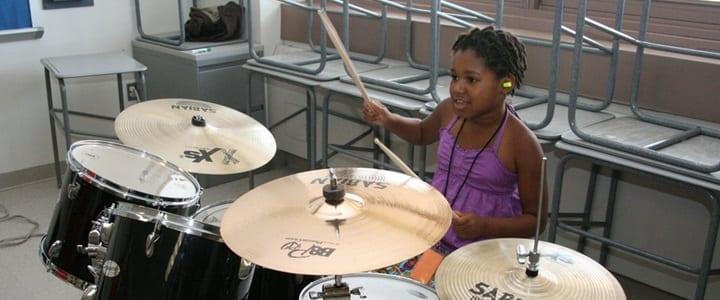Not sure if your son or daughter is ready to start drum lessons? Want to know the perfect age for a child to learn drums? Here, Saint Paul, MN drum instructor John S. explains the best way to determine if your child is ready for drum lessons…
When your child is interested in taking drum lessons, you may ask yourself: “is my child ready to learn drums?”
The short answer is there is no standard, perfect age for a child to begin music lessons. There are pros and cons to starting at a young age, but the most important thing (for both parents and teachers) is to manage expectations based on the child’s age and skill set. Below are three important categories to evaluate when making the decision of whether or not your child is ready to learn drums.
1. Physical Development
Does your child have enough strength and coordination to hold drum sticks? This is one of the most important questions to answer when you look into drum lessons for your child. If the answer is no, there are still a number of ways to introduce your child to rhythm, and prepare him or her to learn the full drum set further down the line.
I often use techniques like lap drumming (hands on thighs), foot tapping, or small hand drums to introduce the idea of using your limbs to create rhythm.
If the student is strong enough to hold a pair of sticks, it’s still important to manage expectations regarding his or her physical ability. It’s generally much harder for young students to control their arm and hand motions, however, learning proper stick technique habits at a young age can pay huge dividends as the student develops more strength and fine motor skills.
2. Attention Span
Many young children struggle to pay attention for long periods of time, especially when it comes to new, challenging tasks. Don’t expect a five year old to sit still and be attentive for a full one-hour drum lesson. I recommend starting young students with shorter lessons (30-45 minutes) and increasing the lesson time as your child’s skills and passion grow.
I also like to break lessons up into small activities to keep things fresh and exciting. For example, I’ll start with ear training where I play a pattern on a drum and the child tries to mimic the same pattern. I also use techniques like dancing or watching musical performances as ways to break the monotony of sitting still behind a drum set for a long period of time.
3. Academic Skills
Like physical development and attention span, academic skills improve as your child gets older. For very young students (ages three to six), It’s important to rely less on printed music versus general ear training and hand-eye coordination skills.
Like the school classroom, it’s imperative to start a student with simple lessons, and let him or her grow at a natural pace. In other words, don’t assign extremely difficult exercises for beginners who don’t have the skill set required to complete those exercises.
After you take this criteria into consideration, ask yourself again, “is my child ready to learn drums?” You should have a better idea of your child’s capacity to learn and improve at the drum set.
Learning the drums is often compared to learning a foreign language: the earlier one starts, the more it will come naturally at a later age. That being said, it’s never too early or too late to start learning the drums, as long as you take these points into consideration.
Think your son or daughter is ready for drum lessons? Find a drum instructor near you today!
John S. is a drum and percussion instructor in Saint Paul, MN. A full-time musician and teacher, he performs with two different bands and teaches in-home and in-studio lessons. Learn more about John here!
Photo by Willie Mae Rock Camp for Girls
Maile Proctor


